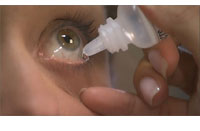Dry Eye Syndrome
 Experiencing dry eyes is common. In most cases dry eye symptoms are temporary and remedy themselves quickly. However, for some people, dry eye becomes a chronic and extremely uncomfortable condition called Dry Eye Syndrome. Symptoms include red, irritated eyes; discomfort or pain; and blurred vision. Left untreated, Dry Eye Syndrome can lead to corneal damage and loss of sight.
Experiencing dry eyes is common. In most cases dry eye symptoms are temporary and remedy themselves quickly. However, for some people, dry eye becomes a chronic and extremely uncomfortable condition called Dry Eye Syndrome. Symptoms include red, irritated eyes; discomfort or pain; and blurred vision. Left untreated, Dry Eye Syndrome can lead to corneal damage and loss of sight.
What causes dry eye?
Basically, dry eye is caused by insufficient or poor quality tear production. The most common cause for this is your environment. Dry, windy, and/or dusty conditions can deplete the tear film coating the cornea faster than the tear ducts can replace them. Tasks such as reading and working on the computer where you are likely to blink less often can reduce tear production. In these cases, once the environmental factors are removed, tear production returns to normal and the symptoms disappear.
On the other hand, poor tear production can be an ongoing problem. There are many factors that can cause chronic dry eye, but the most common are:
- Aging – As we age it is more difficult to maintain adequate tear production.
- Medication – Many medications such as antihistamines, high blood pressure meds, and antidepressants can cause dehydration, resulting in reduced tear production.
- Inflammation – Inflammation of the tear ducts or eyelid can damage lubricant-producing glands.
- Eye surgery – Surgery such as LASIK can cause prolonged dry eye symptoms, but usually return to normal in about six months.
- Menopause – Hormonal changes can decrease lubricant production.
- Staph infections – Infections on the lid margins decrease tear production.
- Demodex – Though it often goes undetected, this parasitic mite in sufficient numbers can damage tear glands. (Insight Eyecare now offers BlephEx to treat Demodex and staph.)
These are only a few examples, but dry eye can be caused by any number of things. Temporary relief from dry eye can usually be gained by using rewetting drops or artificial tears (do not use drops that claim to reduce redness as these products actually reduce moisture on the cornea and aggravate the problem). Also, applying a warm compress such as a warm, damp washcloth to your closed eyelids can make your tears more viscous and reduce inflammation in your tear ducts, restoring moisture to the cornea.
Although these remedies may offer temporary relief, it is important to schedule a comprehensive eye exam with your eye doctor. Your doctor will be able to pinpoint the cause of your dry eye and prescribe the proper treatment.
What to know before you see the eye doctor.
It is important to make a few notes prior to your eye exam. The more information you can give your doctor about your symptoms, the better he will be able to treat your dry eye. For instance, make note of the following:
- When and where are your symptoms most irritating? In the morning or evening? At work? While watching TV?
- Did anything change right before the symptoms started? Did you start taking new medication? Did you move or change jobs? Even something that you may find insignificant could be important.
- Make a list of other medical conditions you have and medications you are taking.
- Take note of any other symptoms you are having, even if you do not think that they are related to your dry eye.
- Be prepared with any questions you may have for the doctor.
This information will give your eye doctor a good starting point before your comprehensive exam. Your doctor may also run a few additional tests to determine tear flow and tear composition. The eye doctor will then discuss your treatment options. Depending on the source of your dry eye symptoms, you may be prescribed medication to increase tear production or reduce inflammation in the eye. Or you may be able to eliminate the source of your dry eye altogether by changing your routine.
Whatever the cause of Dry Eye Syndrome, the symptoms can be very disruptive on a daily basis. Scheduling an eye exam and discussing your situation with your eye doctor could very well set you on your way to a better quality of life.
Dr. Jeff Pinkerton
iCare for you.
